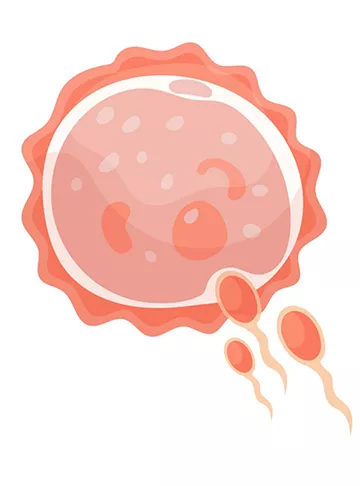What is ICSI?
Intracytoplasmic sperm injection (ICSI) is a specialised form of In Vitro Fertilisation (IVF) in which a single sperm is injected directly into the egg for fertilisation.
Infertility can affect anyone, and it may be caused due to medical issues with either the male or female partner. Thankfully, medical science has now evolved to a great extent offering successful treatment for infertility in many cases. Procedures like ICSI, IUI, IVF, ZIFT, GIFT, etc., are now being used to successfully treat various types of fertility issues and help people become parents.
Intracytoplasmic Sperm Injection (ICSI) is a type of assisted reproductive technology (ART) procedure used to treat infertility. In this process, a single sperm (or sometimes multiple) is directly injected into an egg using a fine needle, which is then fertilised in a laboratory and implanted into the woman's uterus.
ICSI is often performed in conjunction with In Vitro Fertilization (IVF) to increase the chances of pregnancy. ICSI is a highly prevalent and valuable treatment option for couples struggling with male factor infertility, helping them achieve their dream of starting a family.
Who needs ICSI?
ICSI may be recommended in the following cases:
1. Low sperm count: If the man's semen analysis shows a low sperm count, Intracytoplasmic Sperm Injection may be recommended by fertility doctors to increase the chances of fertilisation.
2. Poor sperm motility: If the sperm are not moving properly, they may have difficulty reaching and fertilising the egg. ICSI can be used to bypass this issue by injecting a single sperm directly into the egg.
3. Abnormal sperm shape: Sperm with abnormal shape or morphology may have difficulty penetrating the egg. ICSI can be used to overcome this issue by directly injecting a single sperm into the egg.
4. Previous vasectomy: If the man has had a vasectomy, ICSI can be used to retrieve sperm directly from the testicles or epididymis.
5. Other fertility treatments have failed: If other fertility treatments, such as intrauterine insemination (IUI), have failed to result in pregnancy, Intracytoplasmic Sperm Injection may be recommended as a next step.
ICSI Treatment Step by Step
The ICSI treatment for fertility involves several steps, from the initial assessment of the couple's infertility issues to the implantation of the fertilised egg into the woman's uterus. Here is a step-by-step guide to the ICSI treatment:
1. Initial consultation: The couple meets with a fertility specialist to discuss their infertility issues and determine if ICSI is a suitable treatment option.
2. Ovarian or ICSI stimulation: The woman undergoes ovarian stimulation to produce multiple eggs, using hormones such as follicle-stimulating hormone (FSH). It is also sometimes called ICSI stimulation.
3. Egg retrieval: The eggs are retrieved from the female partner's ovaries using a minimally invasive procedure, typically under local anaesthesia.
4. Sperm collection: The man provides a semen sample, which is analysed in the laboratory to select the best quality sperm for injection. It should be emphasised that the collection of sperm and retrieval of eggs typically occur on the same day, and in preparation for the sperm collection, the male partner will be instructed to refrain from sexual intercourse or masturbation (with no ejaculation) for a period of two to three days beforehand.
5. Sperm preparation: The sperm is prepared for injection by washing and selecting the most viable sperm cells.
6. Injection of sperm: Using a fine needle, a single sperm (healthy and viable one) is injected directly into each mature egg.
7. Fertilisation: The fertilised eggs are observed in the laboratory for signs of successful fertilisation and cell division. The embryos are allowed to develop in the laboratory for several days.
8. Embryo transfer: One or more embryos are then transferred into the woman's uterus using a small catheter, typically 3-5 days after fertilisation.
9. Pregnancy testing: Approximately two weeks after the embryo transfer process, a pregnancy test is performed to determine if the procedure was successful.
What is the ICSI treatment success rate?
ICSI is utilised in around 60% of all IVF procedures, and it has been shown that the likelihood of a successful pregnancy is comparable between ICSI and conventional IVF procedures. When performed with cutting-edge equipment and by world-class fertility doctors, fertilisation can be achieved in 50% to 80% of ICSI attempts.
Risks associated with ICSI
Like any medical procedure, ICSI (Intracytoplasmic Sperm Injection) carries some risks, although they are generally low. The specific risks associated with ICSI can vary depending on the individual case, but here are some of the potential risks:
1. Multiple pregnancies: There is a higher risk of multiple pregnancies with ICSI, particularly if multiple sperm cells are transferred to the uterus. Multiple pregnancies can considerably increase the risk of complications during pregnancy and childbirth, as well as increase the risk of premature delivery.
2. Ovarian Hyperstimulation Syndrome (OHSS): In rare cases, ovarian stimulation can lead to OHSS, a potentially serious condition in which the ovaries become swollen and painful. Symptoms can include abdominal pain, bloating, and shortness of breath.
3. Bleeding & Infection: There is a small risk of bleeding or infection at the site of the egg retrieval procedure.
4. Birth defects: While the risk is low, some studies have suggested a slightly higher risk of birth defects in babies conceived through ICSI compared to natural conception. According to medical professionals, the root cause of infertility is believed to be a possible factor in these complications rather than the ICSI fertility treatment itself.
5. Failed Fertilisation: In some cases, none of the eggs injected with sperm will fertilise, or the resulting embryos may not develop properly.
6. Psychological & Emotional risks: The process of undergoing fertility treatments such as ICSI can be emotionally challenging and may lead to anxiety, depression, and stress.
It's important to note that many couples successfully undergo ICSI without any complications. However, the ICSI process can be a complex and emotional journey for couples struggling with infertility. By working closely with an expert fertility specialist and following all recommended guidelines & precautions, the risks associated with ICSI can be easily minimised.
Pregnancy Calculator Tools for Confident and Stress-Free Pregnancy Planning
Get quick understanding of your fertility cycle and accordingly make a schedule to track it
Get a free consultation!















